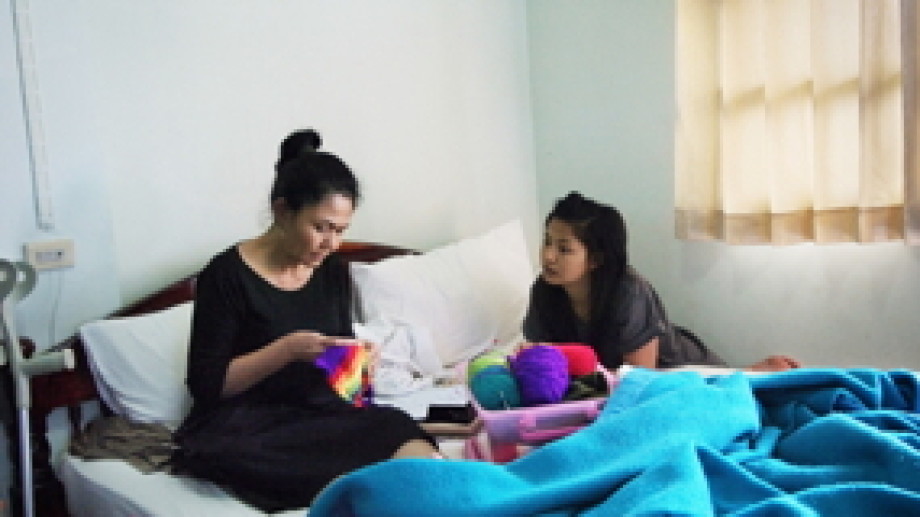
Jenjira Pongpas and Maiyatan Techaparn in Mekong Hotel, which debuted at Cannes and played in Locarno last week.
There may be no better artist working in contemporary cinema than Thai filmmaker Apichatpong Weerasethakul. His ascent to “Master of Cinema” status was confirmed in many of our minds long before he won the Palme d’Or for Uncle Boonmee Who Can Recall His Past Lives in 2010. His last three features have all been masterworks, the best that this young century has had to offer, and while they may all retain a certain serene quality and a quietness that permeates most of his work, that doesn’t necessarily contradict that they each have been considerably ambitious films. After Boonmee, his film with the grandest scale, it makes sense that Apichatpong would settle down and make something small.
Mekong Hotel is a moyen-métrage set beside the Mekong River in Southeast Asia, an important location from the director’s youth. Alternating between a very limited set of interior and exterior shots at the hotel, the actors act out select scenes of dialogue from a film Apichatpong planned to make about “pab ghosts” (female ghosts known in Northeast Thailand that sneak out at night to eat entrails). Without any “proper” set design or artificial details in the mise-en-scène—aside from some fake entrails and blood — the setting is naturalist, and the mood casual. The actors read their lines very much in the mode of a rehearsal, their imprecise positions in the frame at odds with the more formal narrative being hinted at. Though there’s a certain sense of continuity from one scene to the next, we ultimately are only witnessing bits and pieces of a larger whole. The emphasis, then, becomes not on the story but more so on the tone set by the acoustic musical score—composed by a childhood friend of Apichatpong’s, who actually appears in the film — and by the meditative stillness of the camera as it records fragments of a half-realized film. The three forces that really emerge as what drive the film are the river, the guitar, and the actors — the latter in regards to their presence as both collaborators and friends to Apichatpong. The result is a strong impression of the love the director feels for his actors, namely Sakda Kaewbuadee and Jenjira Pongpas, who have each been in several of his movies, and a solemn nostalgia for things gone by.
Without a proper sense of character or narrative, these simple elements become our basis for relating to the film. Apichatpong’s ability to generate pathos through these minimal means is emblematic of his talent. The scenes of dialogue in the film, though fragmented and lacking context, are nevertheless moving. One shot in particular, as Jenjira, in monologue, begins to cry and curse her life, evokes a suppressed devastation that is difficult to handle, especially for those who have formed a sort of relationship from seeing her in Apichatpong’s films. One can imagine, then, how it makes the director feel, himself. The actual film project of which Mekong Hotel forms a series of sketches was to be called Ecstasy Garden — a film Apichatpong no longer plans to make, claiming that “Mekong Hotel showed me what it would be like, how this actress would deliver this kind of dialogue…it is enough.” What does this suggest about cinema? It as if the basic emotions are enough, the full film that will never exist is not necessary, and for the audience to feel and to care, the details don’t seem to matter — instead just the purity of sensation remains essential. As with all of Apichatpong’s films, it seems memory is once again the central preoccupation, and as we are afforded time to stare out at the Mekong River we tap into a certain connection, a closeness to the director’s own feelings. It’s an intuitive experience that is difficult to articulate — a central definition of Apichatpong’s cinema.

The recorded monologue of Sakda Kaewbuadee plays by the Mekong River in Apichatpong's new short film, Sakda.
Sakda, a 6-minute short film that debuted here at the Locarno Film Festival, is very much a companion piece to Mekong Hotel. Once again featuring the Mekong River, Sakda Kaewbuadee and the guitarist, but created as part of a series of short films inspired by the writing of Jean-Jacques Rousseau. As Apichapong’s friend plays guitar, Sakda solemnly speaks into a microphone about changing identities and ultimately disappearing. In a somewhat bifurcated structure reminiscent of Tropical Malady and Syndromes and a Century, we hear the same monologue from Sakda again, but this time with a recording device playing back the audio, fore-grounded in the frame, with the Mekong River as backdrop. A similar dynamic of half-formed, hinted-at ideas comes into play, and as with most of Apichatpong’s cinema, this single film, though standalone, feels incomplete without the interaction with others, specifically of location, character, music, composition with Mekong Hotel. In fact, I would argue that all of his films are, to some extent, a part of each other, one sprawling universe of cinema. Sakda is even wearing the same t-shirt that we see him select from his wardrobe in an early Mekong scene.
Also including his short film Ashes, which played at Cannes and is streaming at MUBI, 2012 is a year of purposefully minor works for Apichatpong. That isn’t to say that these are not great films—they are—but that they lack a certain cinematic magnitude, and are content to exist as smaller, even quieter works, a sort of buffer before the next round of masterpieces we would be naïve not to expect.
Adam Cook is a freelance film critic and editor for MUBI, based in Vancouver, BC. You can follow his blog, Cinémezzo</a>, and find him on Twitter as @AdamCook.
More dispatches from the Critics Academy participants will be published on FilmLinc.com through the end of the Locarno Film Festival on August 11. Keep watching for their bylines in the coming days!



